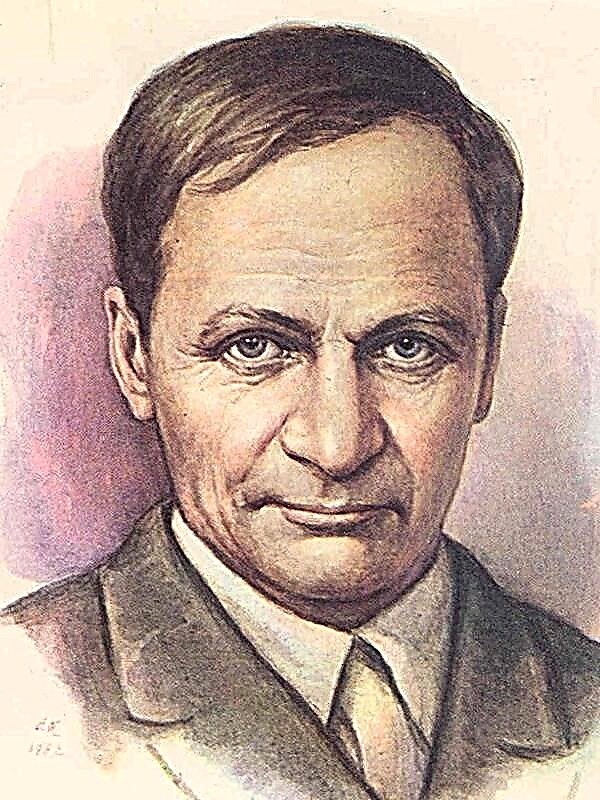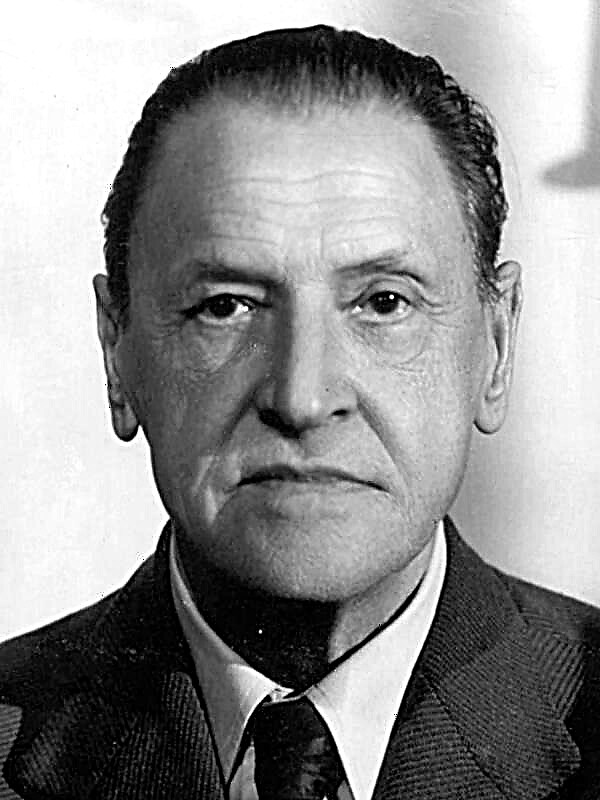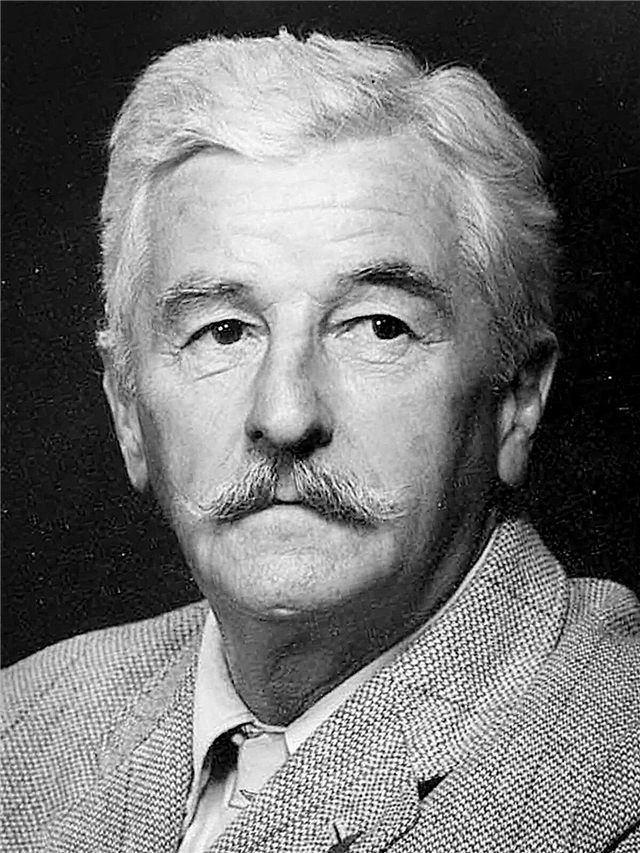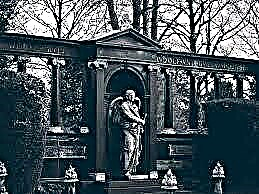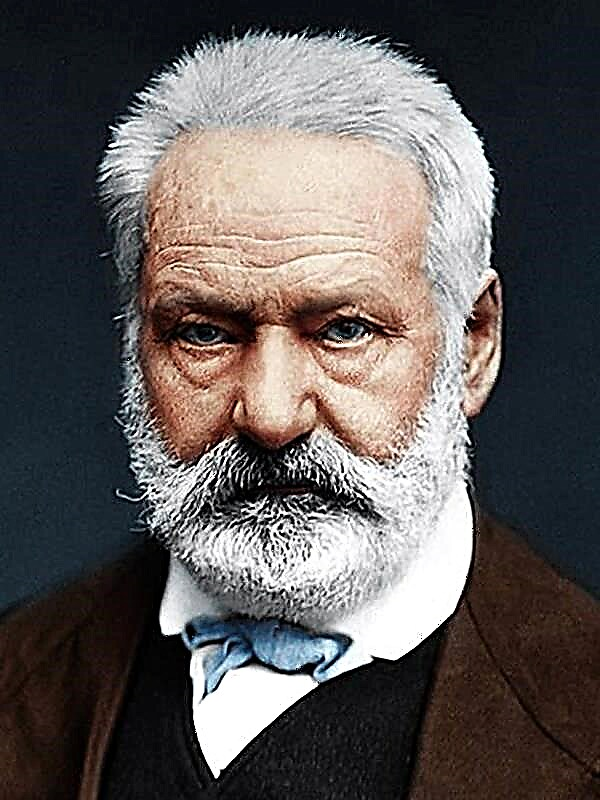The play, from beginning to end, takes place in the solemn atmosphere of the Trondheim Cathedral in Nidaros, the medieval capital of Norway. On the sides of the stage are burial niches, in the center is the tomb of Harald, the grandfather of the reigning king Hakon Shirokoplekh. The closest to the audience in the foreground are massive temple columns, on one of them are the monograms “A” and “B” - Axel and Valborg, the names of the characters of the play whose love is doomed - they are half-brother and sister, and their mothers are buried right there in the cathedral.
However, Axel and Valborg were teased by the “bride and groom” in early childhood, when later their friendship began to develop into love, Axel was hastened to be removed abroad to German lands, where he, together with the Bavarian Duke Heinrich Leo, successfully fought with the Wends and the the youth turned into a brave and self-confident warrior. Axel is an ideal hero, and of course he did not forget Valborg, Accustomed to victories, he did not give up his lover and obtained permission from the pope Adrian for marriage - the papal bull breaks his blood relationship with Valborg.
Full of bright expectations, Axel returns to his homeland. Appearing to Walborg in the guise of an old man, he checks her feeling and, making sure of her loyalty (Walborg hangs fresh wreaths on the monogram column every morning), demands that King Hakon give his beloved as his wife. But the king also claims the hand of the beautiful Walborg and considers her his right, he is her protector and guardian. He considers Axel’s demand unnatural, having learned about the permission received, he is going to solve the case by force, but allows himself to be persuaded by his confessor, the malicious Dominican monk Knud, who promises to prevent Axel’s marriage to Valborg with the help of church hooking.
In fact, Knud very convincingly proves to Bishop Erland that the papal permission given to Axel is not valid: the bride and groom are brother and sister not only by blood, but also by baptism: Axel was baptized only at the age of five with her then born Walborg, but the pope did not give permission to break this connection. The bishop is sorry to admit the validity of Knud's arguments - they are documented by entries in the church book. With a heavy heart, he embarks on a ceremony other than the separation of the bride and groom: Axel and Valborg take on the opposite ends of the canvas, and it is cut between them by the blow of the sword, which Monk Knud inflicts.
Axel and Walborg are desperate: a second appeal to the pope is impossible - Pope Adrian is dead, and the new head of the church, for political reasons, is more favored by the king. Fate, thus, again turns against the lovers. Having said goodbye alone in the cathedral, they, like good Christians, humble themselves with their fate, promising each other to reunite together in heaven.
But such an end to the matter is objectionable to sympathy for the young Bishop Erland. In his youth, he experienced a similar tragedy - he was separated from his beloved, who, against his will, was given out as another. Erland’s feeling is shared by Axel’s friend William, a gloomy-looking young warrior who arrived from Axel from abroad. According to Wilhelm’s own admission, he is “a cross between a sheep and a wolf”: the son of former lover Erland Eleanor and a certain Rudolph. Wilhelm promised his deceased mother to convey her last “forgiveness” to her warm Friend, and therefore it was no coincidence that he was in company with Axel. Well-intentioned, Bishop Erland and Wilhelm avenge their destiny impersonal and indifferent to people's suffering. They resort to the so-called "pious deception." The bishop gives William a golden helmet, cloak and iron spear of St. Olav buried in the Trondheim Cathedral, the ghost of which, according to legend, appears from time to time in the temple at night, arriving at the cathedral at midnight in the vestments of the dead king, William orders the bowing before him in awe of the guard to leave from the church, but a monk who doubted the miracle and suspected a monk's deception, pierces the sword for unbelief (before the death in repentance, the monk actually admits that he does not believe not only in miracles, but even in the immortality of the soul). Walborg, who should be married the next morning with King Hakon, is thus free, and Axel can take her away on a boat prepared for flight.
But Axel again challenges his destiny. He cannot leave King Hakon. Just this morning, the candidate for the throne, Erling, enters Nidaros with his considerable squad. A distant cousin of the king, Axel is connected with him by bonds of fidelity and honor, the vassal must protect his master.
King Hakon is struck by Axel’s nobility, In a rag, which he bandages his wound, Hakon recognizes a piece of the canvas cut off during the ritual of separation of the bride and groom. But does Axed want to give Hakon good for his evil, thereby humiliating him? Axel reassures the king - he wanted to take Walborg for his heart, Axel knows how great the power of love is and does not take revenge on the king, his intentions are pure - protecting the king, he does his duty and hopes that he will repay him kindly for good.
At this moment, Erling's warriors burst into the cathedral. Under the pretext that the battle helmet of the wounded is too heavy for him, Axel puts him on his head. He and the king defend themselves from the attackers, until help arrives at them - birkebeyner (warriors-lapotniki, a kind of people's militia). But it's' too late. Mortally wounded Axel (he was mistaken for the king) dies with his beloved’s name on his lips. Called for the last farewell, Walborg finds Axel already dead, she asks his German friend to sing her a folk ballad, which she herself has never managed to sing because of tears strangling her. Wilhelm performs the ballad to his own accompaniment on the harp: Knight Ore arrives on the island to meet with his dear Elsa, but exactly one month later the illness brings him to the grave. Else is grieving and crying for her bridegroom, and the strength of her grief is so great that she lifts the dead man lying in the tomb. Pulling the coffin onto his shoulders, he knocks on the door of Elsa's house, but she does not let him in, demanding that he first pronounce the name of the Lord. Ore does not fulfill her requirements, but promises Elsa that she will remember him in joy and sorrow. Rooster screams - Ore time to grave. Ore disappears, and Else grieves and mourns him, until exactly one month later the disease reduces her to the grave too.
After singing the song to the end, Wilhelm notices that Valborg clinging to the body of Axel is dead. William's squire entering the temple announces: King Hakon has just died in a battle. Evil fate, therefore, will not pass anyone in the tragedy.
King Hakon the Broad-shouldered, a real historical figure, really died in the battle with Erling in 1162.


